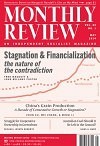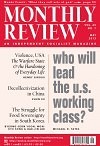Marxism

Monthly Review celebrates its sixty-fifth anniversary with this issue. Today the causes for which the magazine has stood throughout its history—the struggle against capitalism and imperialism and the battle for socialism as the only alternative path—are more pressing than ever. Indeed, so great is the epochal crisis of our time, encompassing both the economic and ecological crises, that nothing but a world revolution is likely to save humanity (and countless others among the earth’s species) from a worsening series of catastrophes.…This may seem like a shocking statement; ironically, not so much because of its invocation of the visible threat to humanity’s existence, but rather because of its reference to revolution as the only solution. | more…
In the past few years numerous authors have examined how the current economic crisis in Spain has differential impacts on women and men. While this is important to show, this article’s goal is to make the leap from a mere description of the gendered effects of the crisis, to an analysis of some of the very gendered processes that shape it at its core. In other words, the intent is to understand how both the crisis itself and the ways the state manages it are structurally shaped by gender.… [This article will argue] that the primitive accumulation, or accumulation by dispossession, currently taking place in Spain is deeply shaped by gender in the sense that one of the main strategies capital develops, and the state implements, is to push the responsibilities that the state formerly had for public welfare back onto women and households. | more…
It was an honor to have my essay “A Radical Approach to the Climate Crisis,” from the summer 2013 issue of Dissent, “read with interest” by the editors of Monthly Review, even if the editors took issue with my argument that the timeframe of climate science indicates that getting off fossil fuels must happen starting immediately and be completed in only a few decades.… As Marxists, the editors of MR should be as radical as reality itself, even when that offends intellectual sensibilities and requires a new flexibility. Anyone literate in climate science must admit that the short-term struggle to mitigate carbon emissions is an essential precondition for achieving any other larger, longer-term goal. The science on this is clear: there is no time left to wait, carbon emissions must come down as soon as possible and as fast as possible. | more…
Our friend and MR author Christian Parenti misunderstood our brief comments (“Notes from the Editors,” MR, November 2013) on his article in the summer issue of Dissent. We did not challenge the science of climate change, which tells us that carbon emissions must cease before one trillion metric tons of carbon have been emitted—a tipping point that will be reached in about 2040 under business as usual. There is no question that the fossil-fuel industry must go. In fact the reality that the world is confronted by a planetary emergency with respect to climate change (and the global ecological problem as a whole) and that the critical threshold will likely be approached by around 2040 (or even sooner) under capitalist economics as usual, is one that has been insisted upon by Monthly Review for twenty years. | more…
Everyone understands that it is impossible to achieve the vision of socialism for the twenty-first century in one giant leap forward. It is not simply a matter of changing property ownership. This is the easiest part of building the new world. Far more difficult is changing productive relations, social relations in general, and attitudes and ideas.… To transform existing relations into the new productive relations, we need first of all to understand the nature of the existing relations. Only then can you identify the mechanisms by which the new relations can be introduced. At this time, there is a great variety of experiments and approaches to changing productive relations which are being pursued. There is no attempt to set out specific proposals here but only to provide the framework in which such changes should be explored in order to move toward socialist productive relations. | more…
We are publishing here for the first time a talk that Herbert Marcuse delivered at Stanford University on April 1, 1966, as part of a two-day conference on Paul A. Baran, entitled “Baran and American Radicalism Today”—commemorating the second anniversary of Baran’s death (on March 26, 1964). The talk was transcribed from a recording from the conference made available to us by Baran’s son, Nicholas Baran. Various editorial annotations have been added in the form of endnotes.
The correspondence of Paul Baran and Paul Sweezy in the 1950s and early ’60s is one of the great, unknown legacies of Marxian political economy in the United States. Over the past year and a half, I have been transcribing all of these letters with the goal of having the collection published by Monthly Review press, both as a hardcopy book of selected letters, as well as an unabridged e-book. In commemoration of my father, Paul A. Baran, on the fiftieth anniversary of his death on March 26, 1964, we decided to refer publicly for the first time to the Baran–Sweezy Letters Project and to publish a few important and representative letters. | more…
Dedicated to the Memory and Legacy of President Hugo Chávez
The need for the establishment and successful operation of The New International is painfully obvious and urgent today. The enemies of a historically sustainable societal reproductive order, who occupy at the present time still the dominant position in our increasingly endangered world, do not hesitate for a moment to exploit in the interest of their destructive design, with utmost cynicism and hypocrisy, the existing decision-making and opinion-forming organs of the international community, from the Security Council of the United Nations to the great multiplicity of the national and international press and to the other mass media under their direct material stranglehold.… At the same time the adherents of the much needed socialist alternative are fragmented and divided among themselves, instead of internationally combining their strength for the cause of a successful confrontation with their adversaries. | more…
Care and the New Emotional Imperialism
The astonishingly high number of women migrating is a new global trend. In the past it was mainly men who went to countries far away; women came as followers. In the last twenty years, however, this has changed so much that today over half of all migrants are women. Furthermore, female migrants have often become the main or single wage earners of their families. Saskia Sassen calls this the “feminization of survival”—societies, governments, and states more and more depend on the work of women in the labor force. Thus the necessary conditions of work and survival fall increasingly on the shoulders of low-waged, deprived, and exploited migrant women. | more…
This is an abridged version of an article by the same title published in Review1, launched in 1965 as Monthly Review‘s literary supplement. Eleanor Hakim was the managing editor of Studies on the Left in its first few years. At the time she wrote this article she was teaching at the New School for Social Research in New York City. Her essay dealt with Brecht’s theory of the subversive role of the artist in confronting what he conceived as the “cultural apparatus”and how this affected his theory of epic theater. Hakim was particularly concerned with demonstrating that Brecht’s critical outlook was confirmed by the way that, after his death, the U.S. cultural apparatus (“the theatrical stock exchange” of her title) was manipulating and de-radicalizing his drama. In this context, she drew out the significance of Brecht’s revolutionary humanism.… —Eds.
In no field do the claims of democratic diversity and free political competition which are made on behalf of the “open societies” of advanced capitalism appear to be more valid than in the field of communications—the press, the written word generally, radio, television, the cinema, and the theatre. For in contrast to Communist and other “monolithic” regimes, the means of expression in capitalist countries are not normally monopolized by, and subservient to, the ruling political power. Even where, as is often the case for radio and television, agencies of communication are public institutions, or mixed ones, they are not simply the mouthpieces of the government of the day and exclusively the organs of official policy or opinions; opposition views are also heard and seen.… The importance and value of the freedom and opportunity of expression is not to be underestimated. Yet the notion of pluralist diversity and competitive equilibrium is, here as in every other field, rather superficial and misleading. For the agencies of communication and notably the mass media are, in reality, and the expression of dissident views notwithstanding, a crucial element in the legitimation of capitalist society. Freedom of expression is not thereby rendered meaningless. But that freedom has to be set in the real economic and political context of these societies; and in that context the free expression of ideas and opinions mainly means the free expression of ideas and opinions which are helpful to the prevailing system of power and privilege. | more…

Millions of people throughout the world mourned the death of Venezuelan President Hugo Chávez on March 5, 2013. Monthly Review responded at the time with numerous pieces posted on MRzine. We would like, however, to record here briefly something of MR‘s own special relationship to the late president, and what we think constitutes his indelible legacy to socialism in the twenty-first century. MR‘s unique connection to Chávez was largely through the influence of István Mészáros—whose relationship to Chávez stretched back for over twenty years, and whom Chávez called “the pathfinder of 21st century socialism”—and through Marta Harnecker and Michael Lebowitz, who both served as consultants to Chávez.… More than a decade followed in which the socialist revolution under Chávez moved forward, creating huge material, social, and cultural improvements for the Venezuelan population, and vastly increased the power of the people over their own lives through new socialist institutions…. The most vital revolutionary achievement in these years was the introduction of the famous “communal councils”—the general idea for which, as Chávez himself stressed on numerous occasions, was taken from Mészáros’s Beyond Capital. | more…

